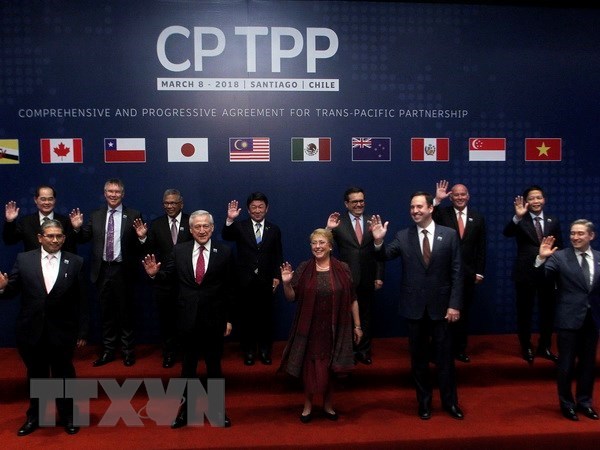Pacific countries seek to expand CPTPP
Chief negotiators of the 11 countries involved in the Comprehensive and Progressive Agreement for Trans-Pacific Partnership (CPTPP) on 18 July met in Kanagawa prefecture of Japan to accelerate the completion of domestic procedures so that the deal will come into effect soon.
 |
| Representatives of CPTPP members at the signing ceremony in Chile last March (Photo: AFP/VNA) |
Head of the Multilateral Trade Policy Department under the Ministry of Industry and Trade Luong Hoang Thai led the Vietnamese delegation to the two-day event.
Japanese chief negotiator Kazuyoshi Umemoto expressed his hope that the deal will take effect on the outset of 2019.
According to consensus among the 11 members, the deal will come into force 60 days after at least six countries complete domestic approval procedures. Together with Japan and Mexico who finished all domestic procedures for the ratification of the pact, Singapore and New Zealand will fulfill all processes this year.
The participants also discussed measures to expand the CPTPP. Currently, Thailand and Columbia have showed their interest in joining the deal.
The original Trans-Pacific Partnership (TPP) was signed by 12 countries in February 2016 but US President Donald Trump pulled his country from the deal upon his inauguration in January 2017.
The remaining 11 countries, namely Australia, Brunei, Canada, Chile, Japan, Malaysia, Mexico, New Zealand, Peru, Singapore and Viet Nam, signed the pact and renamed it the CPTPP in March 2018 in Chile.
The pact is expected to boost economic growth, create more jobs, reduce poverty and improve the quality of life for people in member countries.
It will create one of the world’s largest free trade blocs with a combined market of 499 million people and GDP of around 10.1 trillion USD, accounting for 13.5% of the global GDP.
(Source: VNA)